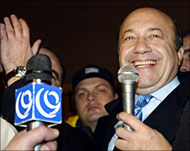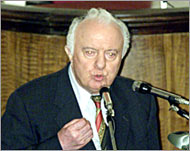Russia mediates in Georgia storm
The Russian foreign minister is meeting politicians in Tbilisi, where President Eduard Shevardnadze is facing fierce opposition.

Igor Ivanov held talks with opposition leader Mikhail Saakashvili early on Sunday and then went on to meet Shevardnadze.
But Saakashvili later stepped up the pressure on Shevardnadze by urging thousands of supporters gathered in the centre of Tbilisi to march on the president’s residence outside the capital.
Shevardnadze fled the seized parliament on Saturday. He refused to give in to opposition demands that he resign and has declared a state of emergency.
Ivanov received a warm welcome at the parliament building shortly after initial talks with his Georgian counterpart, Irakly Menagarishvili.
Thousands of protesters, still holding a vigil at the parliament, applauded as a smiling Ivanov shook hands with parliament chairman Zurab Zhvaniya.
Moscow’s role
Saakashvili said after talks with Ivanov that Russia would “play a constructive role” in attempts to find a solution to the crisis.
“I passed on to Igor Ivanov our position of principle, which is that the president and parliament in this country must change. He promised to pass this on to President Shevardnadze,” Saakashvili told the Rustavi-2 television channel.
 |
|
Igor Ivanov was warmly greeted |
“Any side, any serious player which will help a peaceful transfer of power, will be welcomed by us,” he added. Saakashvili quoted Ivanov as saying that “the use of Russian
military forces in Georgia is ruled out”.
“Russia is not interfering in Georgian affairs. It has never done so and will not do so in the future, but we are not indifferent to its fate,” Ivanov assured reporters upon his arrival.
“We are concerned in principle that all developments evolve in the framework of the constitution and law, and any such resolution will answer the long-term interests of Georgia and the Caucasus as a whole,” the minister added.
Use of force
Shevardnadze said the army would take over if the newly elected parliament was not allowed to meet to ratify the emergency decree within 48 hours, as required by the Georgian constitution.
However, it appears unlikely that deputies will return, after being forced out by the opposition amid chaotic scenes on Saturday.
The country’s armed forces have so far not intervened. Defence Minister David Tevzadze said he had received no orders from Shevardnadze, his commander in chief, to use force to restore order.
Armed personnel carriers have been spotted on Tbilisi’s streets, but security forces allowed demonstrators into parliament – some even offering words of encouragement.
US interests
Meanwhile, as opposing political groups are fighting for power
in Georgia, behind the scenes two bigger forces – the US and Russia – are also slugging it out for influence in the country.
|
|
|
Shevardnadze has warned he |
US Secretary of State Colin Powell was reportedly considering a trip to Tbilisi to push US interests.
Since the fall of communism, Moscow and Washington have tried to keep on friendly terms, but in Georgia their competing interests have left them in a Cold war style head-to-head confrontation.
Both sides have a major stake in the outcome of the drama being played out in Tbilisi.
“Georgia is strategically important because that is where NATO, in the shape of Turkey, meets Russia,” said Zeyno Baran, director for international security and energy at the Nixon Centre in Washington and a specialist on Georgian affairs.
Another factor is oil. Georgia has none itself but it is on a transit route for the export of crude oil from the nearby Caspian Sea, where western oil companies are hungrily developing new fields.
